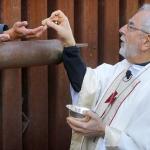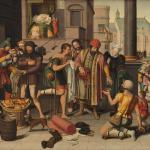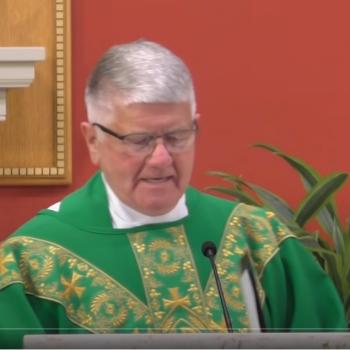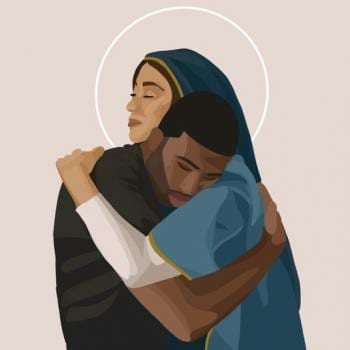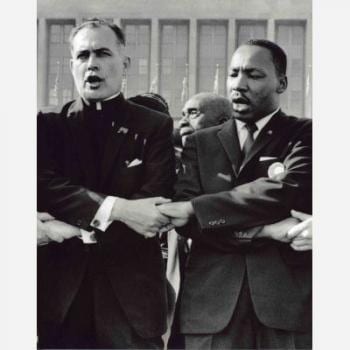In 1997, I was received into full communion with the Catholic Church. That same year, I joined the Society of St. Vincent de Paul (The Society) on the recommendation of my spiritual advisor, who diagnosed me as an “arrogant prick” and prescribed “sustained, intimate service to the poor” as a remedy. All these years later, after hundreds of home visits personally attending to our friends in need, I’ve just begun to make some progress. The remainder of my rehabilitation will no doubt have to be realized in those “frigid purgatorial fires” mentioned by Eliot.
Frederic Ozanam, a 20 year-old law student at the Sorbonne, and some of his friends, founded the Society in 1833. Ozanam and the others represented the student body’s Catholic faction, but in the aftermath of the June Rebellion of 1832, depicted so memorably in Victor Hugo’s novel Les Miserables, they were challenged by students in the anti-Catholic republican faction to prove the Catholic Church’s claim to be on the side of the poor, which was indeed a complete falsehood at that time. The Church had long been the lapdog of French royalty, both in the Ancien Régime and following the Bourbon Restoration. Ozanam and his companions resolved to change things from the ground up. “Let us go to the poor!” became their rally cry and the Society was born. Today, the Society is a global, lay movement headquartered in Paris and with members in nearly every country. Vincentians provide person-to-person service to the needy, meeting them in their homes in order to bring dignity, friendship, and material aid. For his part, Ozanam went on to become a professor of law at the Sorbonne and led the nascent movement until his death at the age of tender age of 40.
In 2008, by means of a path I can no longer recall but which I’m convinced was the work of the Holy Spirit, I “met” Dorothy Day for the first time. I had heard of Day and the Catholic Worker (CW) movement, of course, but I had not previously engaged with her biography and worldview. Doing so precipitated the third great spiritual and intellectual revolution of my life, the first being my “discovery” of Catholicism itself, the second being my introduction to the work of Rene Girard. I was and remain entranced by Day and especially her commitment to live a life radically centered on identification with the poor, the works of mercy, nonviolence, and a wholesale transformation of the social order.
In 2013, I was tapped to serve as the president of SVDP Rhode Island. I had not been in Vincentian leadership before, preferring to simply perform the works of mercy as prescribed by our Rule. As I have progressed in the role of president, I have become increasingly alarmed at the essentially bourgeois character of the Society. We are mostly comfortable middle class people exercising a sort of Catholic noblesse oblige, often with judgment; seldom from a deep sense of identification with those we serve. Vincent de Paul said that “the poor are our masters,” but I’ve seen little consciousness of that spiritual reality in our work, including my own. This is perhaps inevitable, a natural by-product of the demographic realities of American Catholicism. The Society is built upon suburban parish-based “conferences,” and the suburban Catholic parish is not, by and large, a radical place. Rather, much of what goes on there seems geared toward confirming middle class people in their comfort, prosperity, and essential goodness; the anodyne homilies and Bible classes, the book clubs and golf tournaments, the capital campaigns, the Religious Ed ticket-punching, check-driven “charity” drives, and patriotic hymns. It all drips with a sense of merit and the privilege that attaches to it. The poor have mostly abandoned the Church, the rich ward off the radicalism of the Gospel by their giving, and the middle-class just want a safe place to worship, not realizing that successful, comfortable people often make the most mediocre Christians.
It is out of this milieu that conferences of the Society spring, so it’s no wonder that we have our problems. I used to see the Catholic Worker movement as the antidote, with its radical focus on voluntary poverty, the communal life, and activism on behalf of workers and for peace. But then I happened across the third chapter of Dorothy Day’s book, Houses of Hospitality, in which she confesses to have “been reading a lot of Ozanam lately.” Dorothy acknowledges that The Society abandoned indoctrination and political activism early on, concentrating instead on the works of mercy themselves. And she reiterates that she and co-founder Peter Maurin felt deeply that both indoctrination and the works of mercy were necessary elements of the Catholic Worker. But she also highlights what she calls “our main difficulty,” namely, the tendency of many in the CW to abandon the works of mercy in favor of propaganda and agitation. Frankly, I see this “difficulty” echoed in the monthly edition of The Catholic Worker that appears in my mailbox. The paper is unrelenting in its concentration on political and peace issues, from nuclear proliferation to the Israeli blockade of Gaza, with almost no content devoted to the practical aspects of feeding the hungry and clothing the naked, much less the intersection of the works of mercy and personal holiness. It is, in a word, unbalanced, and in that way similar to many St. Vincent de Paul conferences, where the works of mercy go on while grave injustices aimed at those we serve remain unopposed.
At any rate, here’s the passage from Houses of Hospitality. It concludes with some pungent quotes by Frederic Ozanam, proving that he was in his time a radical who nevertheless found a healthy balance between mercy and activism. Incidentally, the definitive biography of Ozanam – at least for the next century – has just been published. Ray Sickinger, chair of the History Department at Providence College, is the author. Get it HERE.
I have been reading a lot of Ozanam lately. He started his religious Conferences of St. Vincent de Paul after the “history conferences” had been carried on for about a year. One of his companions confessed himself to be tired of the “eternal controversies”.
The difficulty with Ozanam’s group was evidently just the opposite of our main difficulty. Dorothy [referring not to Day herself, but to a volunteer also named Dorothy] has been married for the past six months and she and Tom are only in the office a few hours a day. They are both mainly interested in propaganda, the getting out of a paper and pamphlets, and are not much interested in the works of mercy or houses of hospitality except as propaganda centers, with a careful weeding out going on all the time so that only those who agree with us and work with us are kept.
Ozanam’s group discarded the propaganda and kept only to the charitable work so that indoctrination did not gohand in hand with charity. We feel that the two must go together since we are trying to change the social order. We have to change the social order so that men will have a chance to become men.
Following Peter’s ideas, we are trying to make the workers into scholars and the scholars workers. So we take whoever comes to us as sent by God and do not believe in picking and choosing. If we start eliminating then there is no end to it. Everyone wishes to eliminate someone else. In a group of people living together more or less in community, grievances always pile up which change from day to day and from month to month. Even if we had only picked “intellectuals”, young students and propagandists, there would be dissensions and grave differences of opinion. Tom and Dorothy are more at home with the scholars and wish to concentrate more on propaganda. As it is, most of the money is spent on food and shelter and not much is left for the paper and for pamphlets.
But Peter and I feel that the work is more important than the talking and writing about the work. It has always been through the performance of the works of mercy that love is expressed, that people are converted, that the masses are reached.
“Charity should never look behind but always ahead, because the number of her past good deeds is always small, whereas the present and future miseries which she must solace are infinite,” Ozanam wrote.
“The faith, the charity of the first ages, they are not too much for our age. Evils equally great must have an equal remedy. The earth has gone cold, and it is for us Catholics to reanimate the vital heat which is being extinguished, to recommence the era of the martyrs. For to be a martyr is a thing within the reach of all Christians. It is to give our lives for God and for our brothers….
“The race of man in our days seems to me like the reveler of whom the Gospel speaks. It, too, has fallen among thieves who stole away its treasure of faith and love. The priests and the Levites have passed and this time, as they were true priests and Levites, they approached and longed to heal the sufferer. But in its delirium it knew them not and repulsed them. In our turn, feeble Samaritans, profane and of little faith though we be, we dare, nevertheless, to accost this great invalid. Perhaps it will not be affrighted at us, so let us try to probe its wounds and to pour oil into them, to whisper in its ears words of consolation and peace, and then, when its eyes re-open, we will put it back into the hands of those whom God has constituted the guardians and physicians of souls.
“When we Catholics reminded these straying brethren of the marvels of Christianity, they used one and all to retort: ‘You are right if you speak of the past; Christianity in other times did wonders, but today it is dead. And indeed, you who boast of your Catholicism, what do you do? Where are the works which prove your faith and would make us respect and admit it?’ They were justified; this reproach was only too well deserved. Well, then, to work! Let our acts square with our faith. And what were we to do in order to be genuine Catholics if not that which is most pleasing to the eyes of God? Let us then help our neighbor as Jesus Christ did, and put our faith under the protection of charity …”
In season and out of season, he pleaded for “the annihilation of the political spirit in the interests of the social spirit.”

